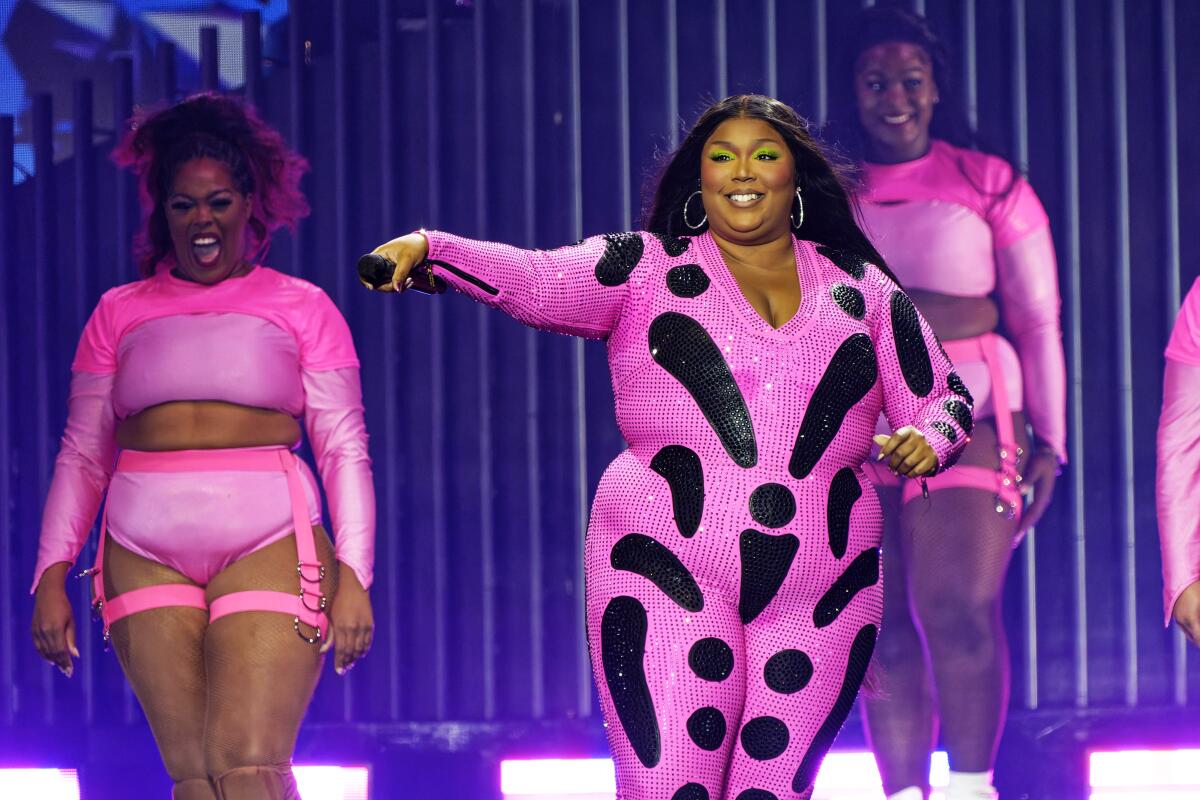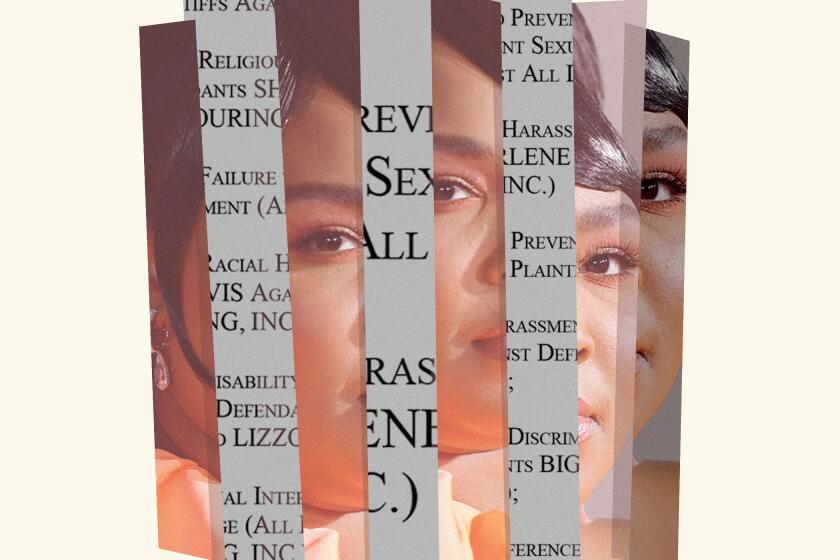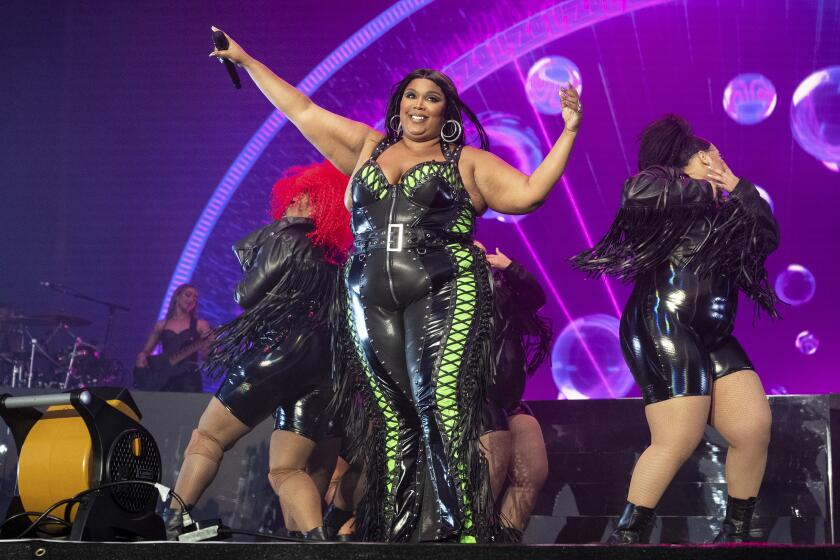Column: Lizzo has many talents. If recent claims are true, being the boss isn’t one of them

- Share via
Hey, managers, here’s a basic HR tip: Don’t take your employees to a live nude performance in Amsterdam. Or any other city, for that matter.
Because if certain allegations in the lawsuit she faces are true, someone should definitely have told Lizzo.
In early August, three of Lizzo’s former dancers filed a suit against the multihyphenate star and her company Big Grrrl Big Touring, alleging, among other things, sexual harassment and the creation of a toxic work environment in which dancers had to fight to be paid fairly.
One of the more headline-grabbing accusations is an account of Lizzo inviting some of her touring cast to an after-show trip to an Amsterdam strip club. There, according to the suit, she encouraged them to “take turns touching the nude performers, catching dildos launched from the performers’ vaginas, and eating bananas protruding from the performers’ vaginas.” According to Arianna Davis, one of the plaintiffs in the suit, Lizzo then badgered Davis into touching one woman’s breast.
In a statement released shortly after the suit was filed, Lizzo categorized the allegations as “false,” “outrageous” and “coming from former employees who have already publicly admitted that they were told their behavior on tour was inappropriate and unprofessional.”
Since the suit was filed, some former employees have voiced their support of the three women, but many of Lizzo’s current dancers released their own statement extolling the joys of working with the star, who has hired well-known attorney Martin Singer to represent her.
Still, as reported by my colleagues August Brown and Stacy Perman, her image, and by extension her business, has taken a palpable hit. Streaming and sales of her music are down, headlines about her “dethroning” have filled legacy and social media, and many fans have expressed shock and sadness about the events described in the suit, particularly Davis’ allegation that she experienced implied pressure to lose weight.
How is it that a woman who built an empire in large part because of her positivity and fierce willingness to call out acts of prejudice and bullying in the music and entertainment industry is now being accused of … negativity, prejudice and bullying?
Lizzo is facing a lawsuit from former backup dancers that threatens to undo her hard-won image as a beacon of empowerment and self-acceptance.
I don’t know if Lizzo is a “narcissistic bully,” as she was called by Oscar-nominated filmmaker Sophia Nahli Allison, who says she walked away from a project with the star because of her “arrogant, self-centered and unkind” behavior. But the picture painted in the lawsuit is that of a highly imperfect manager, both of her employees and her brand.
After all, there is certainly nothing wrong with inviting a group of friends to join you at a strip club. And in any given group, there is inevitably a queen bee who pesters her friends to do things beyond their comfort zone.
The problem is that, in the alleged scenario in Amsterdam, Lizzo was not the leader of a group of friends; she was their employer. And unless we’re talking about a group of health inspectors or adult entertainment creators looking for inspiration, strip clubs are not a great idea for company gatherings.
At a time when workers in every industry are rejecting the time-honored and often abusive experiences once known as “paying your dues,” it is shocking to see Lizzo accused of presiding over, and, according to the suit, directly participating in, the same sorts of behavior — bullying tactics, inappropriate comments, job insecurity, unfair pay and an atmosphere that demands gratitude for “the opportunity.” .
It’s not the first time Lizzo has faced complaints from her dancers. Earlier this year, 14 other dancers alleged they had not consented to or been paid for conversations and work that appeared in the 2022 documentary “Love Lizzo,” which was produced in part by Lizzobangers with Lizzo credited as an executive producer. The dancers reached a settlement that, according to Singer, Lizzo “had nothing to do with ... and knew nothing about.”
It is possible that the three women in the August lawsuit — Davis, Crystal Williams and Noelle Rodriguez — are, as Lizzo has said, disgruntled former employees spreading lies for personal gain. Davis and Williams, who joined Lizzo’s troupe in 2021 after competing on her Emmy-winning reality show “Watch Out for Big Grrrls,” were indeed fired. Williams says her public termination came after she disputed accusations that some of the dancers were drinking before performances; Davis says in the suit that she was fired for recording a meeting. Rodriguez, who was hired the same year after appearing in one of Lizzo’s music videos, says in the suit that she resigned in protest of Williams’ firing and included an ugly confrontation with Lizzo, the details of which are very much at odds with the performer beloved by so many.
In part because she had overcome so much to achieve success.
It is certainly true that at some point we, as a culture, must stop deifying people whose work, message or backstory we admire. Time and time again we bang our heads against the immovable truth that a person can have worked against incredible odds to become an awe-inspiring performer/writer/politician/spiritual leader and still be a terribly flawed, or just plain terrible, employer/friend/parent/spouse.
Some of these flaws may be cause for arrest, litigation, workplace termination or industry rejection. Others should serve as a reminder that people make mistakes and/or that one can love the art and not the artist, something we currently struggle with as we recategorize what is unforgivable and what is not.
In February, 14 dancers who performed with Lizzo during the 2019 Video Music Awards settled a payment dispute after they discovered behind-the-scenes footage of them was used without their permission in HBO Max’s “Love Lizzo” documentary.
But it is also true that a person who builds a career on a certain message or persona should take great care that their business practices scrupulously follow the dictates of that message or persona.
As every politician, self-identified spiritual leader or seemingly kind talk show host knows, nothing brings controversy faster than the suggestion that you do not practice what you preach.
Artists do not always make great employers, which is why the smart ones hire teams of experienced people to do most of the managing. And, as Ellen DeGeneres discovered, having hired those teams, the artists are obligated to take responsibility for their actions: The suit against Lizzo also includes a number of accusations against her dance captain Shirlene Quigley, who is alleged to have pushed her Christian beliefs on the dancers and harassed Davis by speaking publicly about the fact that she was a virgin.
Again, if these allegations have merit, it would seem what Lizzo and Big Grrrls needed more than anything was management training. A dance troupe may not feel like a corporate office but the same rules, and laws, do apply.
Especially as young people increasingly push back against the traditional “suck it up, newbie” attitudes that hid so much racism, sexism and general exploitation, everyone in a management position should know to keep their religious views to themselves and comments about other people’s sex lives out of the mouths.
Hahahahahahahahaha. Sorry. I am aware of both the validity and the absurdity of that statement even as I write it. Because the types of complaints listed in the suit against Lizzo (with, one prays, the exception of the alleged banana-in-vagina incident) of course occur on a daily basis in workplaces across the country.
But outside of court, the “what” in this case may not be as important as the “who”: If your success is fueled by your message of female empowerment, then it is your duty, fiduciary if not moral, to ensure that neither you nor anyone you hire is generating even the perception that your business practices are at odds with your brand.
And again, for those in the very back: As a work-party venue, a strip club is never, ever a good idea.
More to Read
The biggest entertainment stories
Get our big stories about Hollywood, film, television, music, arts, culture and more right in your inbox as soon as they publish.
You may occasionally receive promotional content from the Los Angeles Times.












